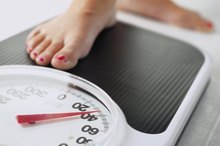How to Force the Body to Burn Fat Reserves
Body fat is stored in fat cells called adipocytes or lipocytes. Excess calories are stored as fat to be used at a later date. Without lifestyle changes, you'll continue to add to your cells' fat storage. Creating a calorie deficit through diet and exercise shrinks fat cells, causing noticeable changes to your physique.
Reduce your daily calorie intake. There are 3,500 calories in 1 pound of fat, so cutting 500 calories from your daily intake of foods and beverages enables you to lose 1 pound per week if you are now eating at maintenance level. Instead of your body using your consumed calories, the reduced calorie intake causes your body to pull fat from the cells to use as energy. Reduce portion sizes by 15 percent, stop high-calorie indulgences and replace high-calorie items with low-calorie alternatives.
How to Get a Smaller Waist & Bigger Butt
Learn More
Perform 300 weekly minutes of moderate-intensity aerobic activity. Reducing your calorie intake and adding 60 minutes of daily physical activity at least five days per week causes your body to pull fat from storage cells at a faster rate and enables you to lose more pounds. If you cut 500 calories from your diet and then burn 500 calories riding your bicycle or from a brisk walk, you can expect to lose 2 pounds per week.
Strengthen your major muscle groups. Muscle tissue helps burn fat, so as you increase your muscle mass, you burn more calories because of an increased resting metabolic rate. Biceps curls, abdominal crunches, pushups, squats and lunges are examples of strength-training exercises. Equipment includes resistance bands, dumbbells, barbells, machines and your own body weight.
Tips
Create a strength-training schedule that allows your muscles to recover between workouts. For example, Mondays are arms, shoulders and chest; Wednesdays are back and abdominals; and Fridays are legs and glutes.
Keep track of your calories with the SuperTracker at ChooseMyPlate.gov.
Warnings
Always consult with a doctor before starting a diet and exercise program — especially if you have an underlying health condition or are considered either underweight or obese.
Performing exercises incorrectly could result in a severe injury. Consult with a personal trainer or coach before exercising alone.
Related Articles
References
Writer Bio
Melissa McNamara is a certified personal trainer who holds a Bachelor of Arts in journalism and communication studies from the University of Iowa. She writes for various health and fitness publications while working toward a Bachelor of Science in nursing.








